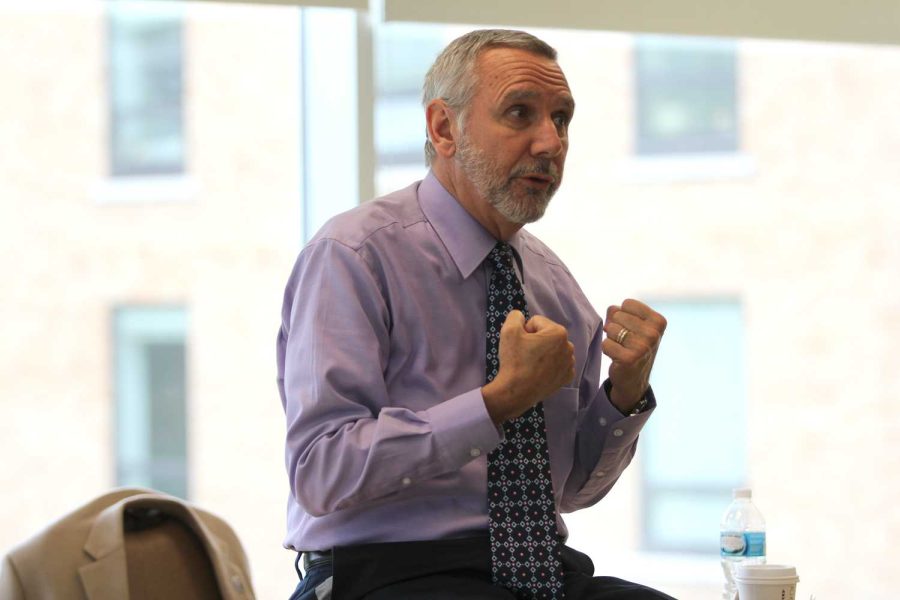For journalist Lawrence Pintak, being immersed in the world of Islam is no alien concept, but rather, a pivotal point of his career.
In an effort by the World Affair Council of Northwest Ohio, Pintak spoke at the University Tuesday about his experience in the Middle East and the American media’s misrepresentative portrayals of other cultures.
“We don’t graze the media,” Pintak said. “We don’t take in a variety of viewpoints. We go to the media organization that reflects back to us our preconceived notion. Anywhere you look, you see the world differently. Some of it is consciously skewed, some of it is just skewed because of the audience or those preconceived notions.”
Pintak’s informal Q-and-A session and lecture took place in room 207 of the Union. About 30 students and faculty interested in journalism and multicultural affairs listened to Pintak speak about domestic coverage of foreign crises and social justice.
Formerly a reporter for major news outlets including ABC, CBS, CNN, Time and Newsweek, Pintak now works at Washington State University as the founding dean of the Edward R. Murrow College of Communication. He said there is a big difference between reporting in the Middle East during his time as a reporter compared to now.
“One of the most fundamental things that has changed is how journalists cover the world,” Pintak said, “is the fact that people now cut our heads off.”
As a CBS foreign correspondent, Pintak covered the Marine barracks bombings in Beruit. He was able to interview the bombers the day after the bombings. Pinktak said that if reporters were to attempt to interview terrorists today, they would “lose their head.”
The number of foreign correspondents has dwindled in recent years due in part to the fear of being kidnapped. Pintak said the silver lining of the decline is that more local reporters, meaning local people, are reporting on their own events for American organizations, changing their “prisms” of cultural awareness.
Pintak has reported on landmark events while corresponding in the Middle East, including the Iran-Iraq War, the invasion of Lebanon, the Libyan invasion of Chad and the kidnapping of U.S. citizens, among others. He said that in his time as a reporter in the region, he has noticed that news organizations have consistent biases relating to cultures they aren’t part of, making Muslims an “other” to American media.
“He said the problem with this coverage is that Americans report about what ‘we do’ and what ‘they are,’” Pintak said, referencing a book by Palestinian American intellectual Edward Said. “This effectively means we all make mistakes, you’re an aberration, you’re different than the rest of us, you killed this guy but that’s just because you’re a nut, but if a Muslim does it, it’s something in the DNA. You really do see this play out in perceptions of stories.”
Pintak’s speech preceded another event scheduled at the University of Toledo on Tuesday. Office of Multicultural Affairs Assistant Director Krishna Han is on the council that flew Pintak to Ohio. She said he was glad he found an available time for him to speak at the University.
“It’s a great opportunity for us to listen to somebody who has such a unique experience,” Han said. “I figured it’s not only the school of journalism that’s appreciative of his talk, but also for people who study international relations.”
Derya Dogan, a Muslim second-year graduate student studying cross-cultural and international education, said Pintak brought up objective viewpoints that she has only heard Middle Eastern media mention.
“I don’t think it was totally on the side of the Muslims or totally on the side of Americans,” Dogan said. “I think he was lecturing from both sides, which is cool and very important.”














